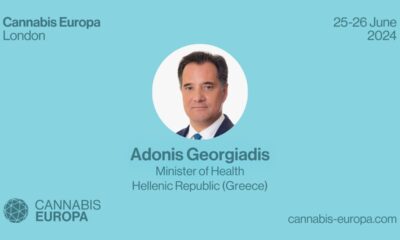Pain and stress specialist Dr Julie Moltke recently joined the advisory council for the Conservative Drug Policy Reform Group. As a medical cannabis prescriber in Denmark, she tells Cannabis Health how the two countries can learn from each other.
Living between London and Copenhagen, Dr Julie Moltke advocates for cannabis on both sides of the channel.
A medical doctor, who has worked in emergency medicine, as an orthopaedic surgeon and as a GP, she currently prescribes medical cannabis to patients at the Clinic Horsted in Denmark.
However, she is also a well-known face in the UK sector, through her involvement with organisations such as CanPass, consulting, speaking at conferences and sharing her expertise.
This summer Dr Moltke was invited to join the advisory panel for the Conservative Drug Policy Reform Group (CDPRG) to help shape evidence-based reform of drug policy in the UK.
She believes her insight from Denmark will play a key role in helping shape the future of medical cannabis here on British soil.
“It was an honour to be asked to join the advisory panel, due to my understanding and experience of medical cannabis in both Denmark and the UK,” says Dr Moltke.
“I think it will be very valuable for both countries and there is a lot that we can learn from each other.”
Medical cannabis has been legal in Denmark since January 2018, 10 months before the law changed in the UK.
While patients here still struggle to get access – with only a handful of prescriptions having been issued on the NHS – GPs in Denmark are permitted to prescribe medical cannabis to their patients.
Those with certain health conditions, such as multiple sclerosis (MS), spinal injury and chronic pain, who have exhausted all other forms of conventional treatment, also have the cost of their medication (up to £1,500) subsidised by the state through a medical cannabis scheme.
Dr Moltke believes that allowing UK GPs to prescribe is the first step to improving access here, with many people who are forced to obtain cannabis illicitly living with conditions such as chronic pain and anxiety.
“A huge majority of people who are using medical cannabis illegally, have conditions such as chronic pain, anxiety, ADHD and PTSD, which are things that you would go and see your GP for,” she says.
Dr Moltke, who specialises in pain and mental health, has conducted extensive research into stress and is an advocate for holistic therapies, including medical cannabis for managing mental health conditions.
“A lot of people with mental health diagnosis are self-medicating and I really hope to see them get help through the legal route, which is why I think the goal should be for GPs to be able to prescribe,” she continues.
“It’s so important to keep in mind that we are pushing to get this on the NHS and educating doctors is key to that.”
However, lack of education is still an issue in Denmark, where many doctors still refuse to prescribe medical cannabis, according to Dr Moltke.
“We also have the problem of doctors not being educated and therefore not wanting to prescribe because they don’t feel they have the knowledge to be able to support their patient,” she says.
“My experience from Denmark is that doctors have to be supported to be able to prescribe and opening up that communication is really important.”
This one area where the UK is leading the way, says Dr Moltke, with a number of support groups and organisations for both patients and clinicians.
“In Denmark we only have one forum for medical cannabis clinicians, whereas in the UK there are already some really good organisations established,” she continues.
“The support network for patients is much bigger in the UK, and that’s what we are missing in Denmark – there are very few people doing the policy work.”
The CDPRG advisory panel, which includes cannabis experts such as Dr Dani Gordon, Professor Mike Barnes and Professor David Nutt, meets once a year to discuss how policy could be developed in the UK.
It aims to protect young people, deliver better health and social outcomes communities, and reduce drug-related harms.
“I’m very excited to be involved,” adds Dr Moltke.
“I hope to be able to use my experience being part of the unfolding of medical cannabis in Denmark, and the experience of patients there, to help shape the future of medical cannabis in the UK, while making sure to keep patients at the centre.”

 News6 months ago
News6 months ago
 News6 months ago
News6 months ago
 News6 months ago
News6 months ago
 Science5 months ago
Science5 months ago
 Industry5 months ago
Industry5 months ago
 News6 months ago
News6 months ago
 Medical cannabis6 months ago
Medical cannabis6 months ago
 News5 months ago
News5 months ago












